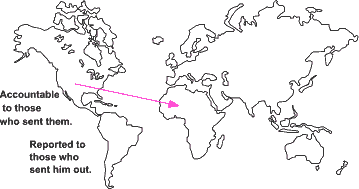We easily spot Paul’s priority of locating and visiting the Jewish place of worship. Upon his visit he proclaims Christ. In every instance it seems to go difficult for him because most of the sudden persecution is because of the hardened Jews against Paul’s message.
 Disciples filled with joy and with the Holy Spirit.
Disciples filled with joy and with the Holy Spirit.
 They entered the synagogue of the Jews.
They entered the synagogue of the Jews.
 Spoke effectively.
Spoke effectively.
 Many believed, both of Jew and Greek.
Many believed, both of Jew and Greek.
 Some Jews opposed.
Some Jews opposed.
 God gave an extended ministry.
God gave an extended ministry.
 God gave them signs and wonders.
God gave them signs and wonders.
 Disciples fled upon the threat of stoning.
Disciples fled upon the threat of stoning.
A few questions …
• If the Jews were so hostile, why did Paul preach to them at all?
• Wasn’t Paul commissioned to preach to the Gentiles?
• Didn’t Paul say in Acts 13:46 that they were now “turning to the gentiles” (13:46)? Why does he return to the Jews?
A few answers …
• Paul’s heart and burden was for his people (Ro 9:2-3; 10:1).
• The Jews already had a foundation in the scriptures.
• The Jews had professed to follow God.
• The Jews would recognize his “degrees.”
• The synagogue provided an accessible public forum.
• Paul also could speak God’s Word to many interested Gentiles.
• Paul says that “But by their transgression salvation has come to the Gentiles, to make them jealous. (Ro 11:11).
 Lycaonia, Lystra, Derbe (Acts 14:6-23)
Lycaonia, Lystra, Derbe (Acts 14:6-23)
 Kept preaching the gospel.
Kept preaching the gospel.
 Paul healed the man lame from birth.
Paul healed the man lame from birth.
 The Lycaonians thought Paul and Barnabas were gods (Zeus [Jupiter] and Hermes [Mercury]).
The Lycaonians thought Paul and Barnabas were gods (Zeus [Jupiter] and Hermes [Mercury]).
 Paul and Barnabas refused homage and preached about the living God.
Paul and Barnabas refused homage and preached about the living God.
 The crowd sides with the visiting Jews
The crowd sides with the visiting Jews
 They literally stone Paul, left for dead.
They literally stone Paul, left for dead.
 They arose and left for Derbe.
They arose and left for Derbe.
 They “made many disciples.”
They “made many disciples.”
A few questions …
• Who were Zeus and Hermes?
• What kind of temptation did this situation prove to be for Paul and Barnabas?
• Why is it that the crowd would at one point worship Paul and Barnabas and then the next moment kill them?
• How do you make a disciple?
• How would your Christian life be different if it grew up in this life context instead of modern living?
 Returned to those cities (Acts 14:21-23)
Returned to those cities (Acts 14:21-23)
 Paul returned through the same cities.
Paul returned through the same cities.
 They strengthened the souls of the disciples.
They strengthened the souls of the disciples.
 They encouraged them to continue on in faith.
They encouraged them to continue on in faith.
 They appointed elders in every church.
They appointed elders in every church.
 Prayed. Fasted.
Prayed. Fasted.
A few questions …
• Why is the follow-up as important as the evangelism?
• How does this follow-up relate to our own lives?
• How would you follow-up a person?
• Why is it that elders could be so quickly appointed in a new church. Doesn’t Paul go against his own advice (cf. I Tim 5:22)?

 Back Home to Antioch (Acts 14:24-28)
Back Home to Antioch (Acts 14:24-28)
It is back home they go to report to the church what is happening. Although the purpose of reporting was a bit different in those days as Antioch was the nerve center for the world-wide church, we should still see many advantages of having missionaries responsible to the local church. Missionary work must be tied in with the local church.
 Traveling is often a difficult part of missions. (Perga > Attalia>Antioch)
Traveling is often a difficult part of missions. (Perga > Attalia>Antioch)
 Gathered the church together.
Gathered the church together.
 Reported what “God had done with them.”
Reported what “God had done with them.”
 Reported the open door of faith to the Gentiles.
Reported the open door of faith to the Gentiles.
 Stayed with them a long time.
Stayed with them a long time.
A few questions …
• What part should missions play in the church? In your life? Why?

“They began to report all things that God had done with them and how He had opened a door of faith to the Gentiles. And they spent a long time with the disciples” (Acts 14:28).

Summary: The end of the first missionary journey!
Missions starts and ends in the local church. The local church must prioritize the work of missions because it is prioritizing what Jesus prioritized: discipleship making. Not only did Paul and Barnabas take great risk to disciple those they had seen come to the Lord but they made those centers reproducing centers.
God has His hand in the work of missions. If the church wants to be anointed with God’s Spirit, they had better be busy doing what God is intending to do.

 Most of BFF articles such as this one is nicely formatted for printing. Check out the great number of articles on the BFF Biblical Training Libraries all for one low cost. Make sure you check out the deal!
Most of BFF articles such as this one is nicely formatted for printing. Check out the great number of articles on the BFF Biblical Training Libraries all for one low cost. Make sure you check out the deal! Iconium (Acts 13:51-14:5)
Iconium (Acts 13:51-14:5)
 Lycaonia, Lystra, Derbe (Acts 14:6-23)
Lycaonia, Lystra, Derbe (Acts 14:6-23) Returned to those cities (Acts 14:21-23)
Returned to those cities (Acts 14:21-23)  Back Home to Antioch (Acts 14:24-28)
Back Home to Antioch (Acts 14:24-28)